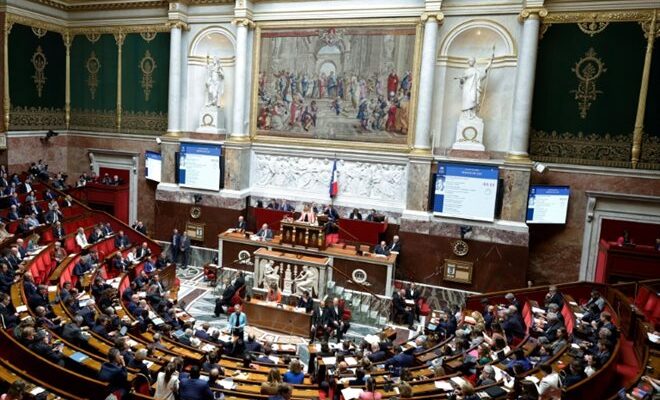French Minister of the Armed Forces Sébastien Lecornu inspects troops during a visit to the 1st Artillery Regiment in Bourogne, France, on April 20, 2023. (AFP/Archives/SEBASTIEN BOZON)
The deputies debate from Monday on the significant increase in the budget of the armies, opposition and presidential camp counting on the parliamentary examination to attack or defend the figures promised by the executive, and mark their divergences of military doctrines.
With 413 billion over seven years (2024-2030), the envelope put on the table by the government for this new military programming law (LPM) is significantly higher than that adopted under the previous five-year period (295 billion for 2019 -2025).
“There is nothing too much”, considers the Minister of the Armies Sébastien Lecornu, who will defend from Monday 4:00 p.m. and for two weeks, the copy of the executive.
The stated objective is to modernize the army, in particular its nuclear deterrent, to improve the treatment of troops, to renew equipment but also to invest in cyber, space and control of the seabed. Thirty billion euros must also be used to cover inflation.
The oppositions intend to point to “announcement effects”. For Anna Pic (PS), this LPM is more a “continuity” than a historic effort, and “100 billion” euros already stem from the previous one.
The Socialists also intend to demonstrate that the objective of 2% of GDP devoted to defence, France’s commitment as a member of NATO, will not be achieved.
In committee, Sébastien Lecornu put this objective into perspective, but also affirmed that it was planned to achieve it before “the end of the five-year term” in 2027, while the initial text provided for a deadline in 2025.
The oppositions also point to uncertainty around 13.3 billion euros, which must be financed by extrabudgetary resources, despite the minister’s insistence that they were not threatened.

The budget of the French armies (AFP / Cléa PÉCULIER)
But their grievance lies in the fact that the most significant budgetary efforts are planned after the end of the five-year term. Several amendments from all sides will propose to impose more efforts by 2027.
Anne Genetet (Renaissance), who must lead the group’s troops in the hemicycle, considers this debate “legitimate”, but invokes a principle of budgetary and industrial “reality”.
“The effort is now,” insists the president of the LR group Olivier Marleix. Right-wing deputies will be prime targets of the executive for the text to be adopted, even if it also hopes to convince socialists.
– Figures and doctrines –
The government also has the accelerated procedure on this text (a reading before the Assembly and the Senate) with the aim of having the text definitively adopted before July 14.
Much of the first week of debates should bring out the differences in doctrine. The overwhelming majority of some 1,700 amendments were tabled on the article which refers to an appended report, a kind of military roadmap for France, both in its doctrine and in the equipment of its armies.

The National Assembly during a session of questions to the government, May 9, 2023 (AFP / Geoffroy VAN DER HASSELT)
The government must table amendments in session to replace equipment sent to Ukraine. But the LPM will lead to a delay in deliveries of several major equipment (Scorpion armored vehicles, Rafale aircraft, defense and intervention frigates, etc.), which worries the opposition.
A debate will punctuate the examination, that of the “mass” against “coherence”: should the army acquire as much equipment as possible, or direct its investments so that those at its disposal are usable (maintenance , coaching…) ?
Ecologists will oppose the project of a future aircraft carrier and the Communists will assert their desire to get out of nuclear deterrence. The Insoumis will raise, among other things, the question of NATO and will present a global counter-project on Monday. The RN will insist on industrial sovereignty. The issue of military partnerships, including European ones, will also be on the table.
The strengthening of the arsenal of the National Information Systems Security Authority (ANSSI), to better fight against cyberattacks, also promises intense discussions on individual freedoms.
For the retention of military know-how and sensitive information, the text also wants to allow the administration to prevent, under conditions, a soldier from working for a State or a foreign company, and this for ten years following the end of his contract. During the session, the government will propose extending the measure to certain civil servants.
© 2023 AFP
Did you like this article ? Share it with your friends with the buttons below.




